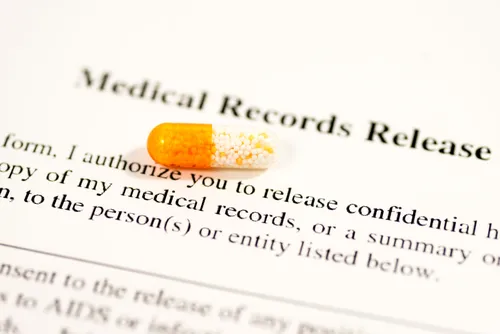The stress of a car accident often doesn’t end once you’ve removed yourself from the scene, especially if there were injuries.
One of the many documents that may come across your plate is the medical records release form, usually provided by the at-fault party’s insurance provider. In many cases, it’s presented as a mandatory form that victims must sign, but do you really have to sign it?
Continue reading for more information about this specific documentation and, more importantly, how to handle it the right way.
What Is a Medical Records Release Form?
Medical records are considered sensitive information, meaning only a select few can view them. A medical records release form authorizes a third party to view this information. By signing one, you’re permitting the transfer of information to the party who requested it.
If you’re involved in an accident and sustained bodily harm, details of your condition are outlined within your medical records. A request from an insurance provider isn’t uncommon after an accident, but like other documentation, it’s something you should review carefully before signing.
What Information Is Included in Medical Records?
Medical records are comprehensive documentation of your medical history. They include which prescriptions you’ve taken, when you’ve taken them, the dates of your medical visits, past/current diagnoses, and much more. In short, it’s a cumulative view of your health.
The Health Insurance Portability and Accountability Act (HIPAA) governs who can and cannot view this information without permission. Some people believe this legislation prohibits sharing your medical records entirely, but it’s merely a guideline that organizations must follow when they need this information.
For example, the at-fault party’s insurance provider may want to see your medical records after an accident. They can’t call your doctor and get this information automatically. Instead, they must request it through a medical records release form, which victims can choose to sign.
What Medical Information Would an Insurance Provider Need?
Insurance providers verify injuries through medical records. Here are a few things they’ll look for:
- Existence
- Severity
- Treatment received
- Any information surrounding future pain
This way, they can compensate you fairly based on your policy and situation. However, there’s a limit to what the insurance provider needs.
You should only share the information pertaining to the incident from which you qualify for compensation. If the at-fault party’s insurance provider requests full disclosure, they may try to use any pre-existing conditions as a disqualification of benefits.
Why Would an Insurance Provider Ask for Medical Records?
The at-fault party’s insurance provider will need to verify your injuries to compensate you for the damage you’ve sustained. They’ll need to access some of your medical records but not all of them.
As you can assume, the opposing insurance provider might not have your best interest. If they request your comprehensive medical history, they could be searching for information to use against you so they don’t have to pay.
If you’ve received a medical records release form and don’t know how to handle it, continue reading — or team up with an experienced attorney.
What’s the Best Way to Handle an Insurance Provider’s Medical Record Release Form?
It’s important not to sign any documentation without reviewing it first, especially after a car accident. If you’re unsure of what to do, it’s best to speak with a lawyer about the best next steps.
Instead of signing their form, you can ask your doctor for the medical records pertaining only to the accident. This way, you can provide the insurance provider with only what they need to offer fair and full compensation — not information that can be used against you.
You can also forgo the initial medical record release form and sign a “limited” record release form. This document should outline the records the insurance provider is allowed to view, which will only include information surrounding the accident you’re requesting compensation for.
Both options are generally the same, but one is more formal and establishes a paper trail. However, if you choose to sign a limited record release, make sure to have an attorney review this document extensively beforehand to ensure all the appropriate records are included.
Contact Morgan and Morgan
Accidents are complicated, but it gets much easier with an attorney at your side. Our team can help you navigate the process, file paperwork correctly, and advocate for rightful value, regardless of who’s on the other side of the table.
Complete our free, no-risk case evaluation to get started.
